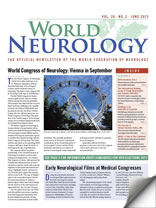At the annual editorial board meeting in San Diego, Vladimir Hachinski, WFN president, and Peter F. Bakker, executive publisher, Global Medical Research Division for Elsevier introduced John England, MD, professor and head of the Department of Neurology, LSUHSC School of Medicine, New Orleans, who will serve as the next editor-in-chief for the Journal of the Neurological Sciences, beginning in July. He will succeed Robert P. Lisak, MD, FRCP, FAAN, FANA, who has served as editor-in-chief since 1997.
During the last 16 years, the journal has experienced enormous growth. Its expanding global presence and impact factor continue to be reflected in the evolving dynamics of its editorial board, authors and reviewers.
Elsevier has announced that it will be initiating several new features for JNS in 2013 to allow readers a quick understanding of online articles. These features will include highlights — a short collection of bullet points that convey the core findings and provide readers with a quick textual overview of the article highlighting what is distinctive about the research; graphical abstract — a concise, pictorial and visual summary of the main findings of the article, which could either be the concluding figure from the article or a figure that is specially designed for the purpose and Google maps — a tool enabling authors to enrich and extend their article by adding interactive maps to highlight their findings in a visual and easily accessible manner. Highlights will be a mandatory element in the submission process but graphical design and Google maps will be optional.
AutoSlides is another new optional, complimentary service available to authors whose papers have been accepted for publication. This service offers authors the opportunity to create a five-minute presentation with slides (Powerpoint or PDF) and voice-over recordings of their work. AutoSlides will appear on ScienceDirect next to the online article.
Finally, Elsevier is working to simplify formatting references. The new strategy is to focus on accurate, consistent data more than strict formatting of references. References may be in any style or format as long as they are consistent and accurate. The reference style used by the journal will be applied by Elsevier to the accepted article. Authors will be required to correct all incorrect or missing data at the proof stage.
Elsevier will continue to analyze the submission and production process in an effort to provide the best technology and editorial support for the journal’s editors, authors and ad hoc reviewers.

